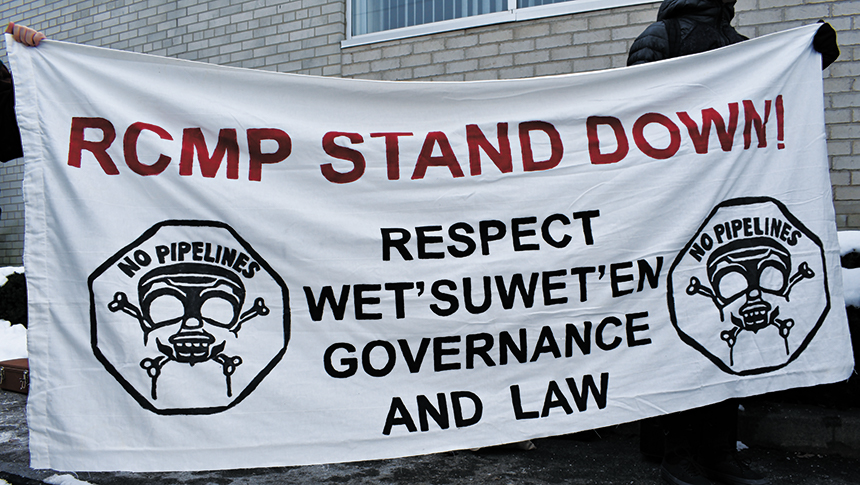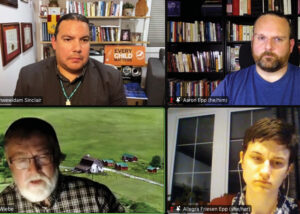“The province of British Columbia alongside Coastal GasLink are continuing their plans to build a pipeline through the unceded territories of the Wet’suwet’en. The five hereditary chiefs and land defenders of Wet’suwet’en have denied access to Coastal GasLink, fearing the pipeline will cause irrevocable ecological damage,” states a call to action for faith communities and individuals that Christian Peacemaker Teams (CPT) issued on Jan. 30.
“Historically the Christian church, the Canadian state and capitalist industry worked together to colonize Canada and displace Indigenous peoples from their land,” the call to action continues. “Today across Canada, many churches are rising up in the spirit of Jesus’ message of peace and justice, and learning about the history and reality of colonization, apologizing for their involvement and/or complicity in colonialism, and getting involved in activities that situate their solidarity with Indigenous peoples and not with the colonial state.
“Now is the time to continue that support and take action! This is our chance, as the Christian church, to demonstrate Christ’s radical love by standing in solidarity with Wet’suwet’en.”
Calls by CPT for action include donating money and food for the hereditary chiefs and land defenders; hosting or joining a solidarity action event; writing letters to B.C. and federal leaders in support of the hereditary chiefs and land defenders; boycotting resource-extraction companies and the financial institutions that back them; and, for those churches in B.C., refusing to “rent space to Coastal GasLink or the RCMP, or to allow their facilities to be used in the service of developing the pipeline . . . .”
Solidarity with whom?
Those who haven’t been keeping up with the news of late might be forgiven for thinking that “the Wet’suwet’en” and “the five hereditary chiefs and land defenders” mentioned in CPT’s call to action are synonymous, and that the community is united with them and their cause. They aren’t, though, as a Jan. 27 APTN (Aboriginal Peoples Network Television) news headline reads: “ ‘We’ve got a real divide in the community’: Wet’suwet’en Nation in turmoil.” So which “Wet’suwet’en” should churches and individuals seek solidarity with?
- On the one hand are the five hereditary chiefs and the land defenders—who, in a Jan. 30 statement, declared: “We are proud, progressive Wet’suwet’en dedicated to the preservation and enhancement of our culture, traditions and [unceded] territories, working as one for the betterment of all.”
- On the other hand are the elected chiefs and band councillors, whose offices were established under the Indian Act, which, they maintain, gives them authority over their six reserve lands. Five of the six Wet’suwet’en band councils would like the financial benefits from the Coastal GasLink project to improve their communities and the lives of their members, many of whom are hoping to find construction jobs on Coastal GasLink’s 670-kilometre pipeline, to be built from the Dawson Creek area of northern British Columbia to Kitimat on the Pacific coast, where fracked natural gas would be processed at a liquefaction plant for shipment overseas.
That turmoil referred to in the APTN article is caused by “misinformed people and organizations in Canada and around the world . . . fuelling the fire,” according to Wet’suwet’en member Troy Young, a 48-year-old father of three who hopes to get work on the pipeline project through Kyah Resources, a company owned by the Witset First Nation. “People are saying the project doesn’t have our approval,” Young told APTN, adding, though, “No one can say the pipeline doesn’t have our backing. We were informed, and people want it.”
Gary Naziel, a former Witset First Nation council member when it struck a deal with Coastal GasLink, agrees. He told APTN, “Everybody voted. Everybody had a say. The final decision was up to the council.”
In fact, after consultations with Coastal GasLink, five of the six elected Wet’suwet’en band councils—along with 15 other First Nations that have land the pipeline will cross—have signed “benefits agreements” with the company.
According to the APTN article, “Along with revenue from impact benefits agreements and provincial pipeline agreements, Indigenous businesses will benefit from $620 million in contract work for the project’s right-of-way clearing, medical, security and camp management needs. There is another $400 million in additional contract and employment opportunities for Indigenous and local B.C. communities during pipeline construction.”
UN weighs in . . . then backtracks
CPT’s call to action refers to the fact that the United Nations Committee on the Elimination of Racial Discrimination and the B.C. Human Rights Commission urged Canada in early January to stop construction on the pipeline until the project has Indigenous consent from impacted communities.
But, on Jan. 16, the chair of the UN committee, Noureddine Amir, admitted that he was “unaware that [Coastal GasLink] had broad Indigenous backing,” and that “the [UN] committee’s role does not include investigating complaints,” APTN reported.
The admission led Karen Ogen-Toews, a former elected Wet’suwet’en First Nation chief and the current CEO of the First Nations LNG (liquid natural gas) Alliance, to declare in an open letter from the Alliance: “The UN committee’s statement and recommendations should simply and immediately be withdrawn [and the committee should offer] an apology to the 20 [First] Nations.” (The Alliance has a financial stake in the project going ahead.)
Where did the division come from?
According to Troy Young in the Jan. 27 APTN story, when the hereditary leaders of the Wet’suwet’en and Gitxsan nations fought a Supreme Court of Canada case in 1997, “Wet’suwet’en and Gitxsan were successful because we had our hereditary chiefs in sync with our elected chiefs, and everybody had the same concerns.”
But Gary Naziel said that, since then, “elected and hereditary leadership haven’t followed the Wet’suwet’en way of making decisions together. . . . ‘It’s been difficult, because in the past 10 to 15 years . . . our laws are not being followed, and it’s disheartening to see that.”
The division between elected and hereditary chiefs became personal in August 2018, when one of Wet’suwet’en’s strong-est pipeline opponents—a hereditary chief—ran for elected office on the Witset First Nation, and was not elected.
“They’ve had opportunities to elect an anti-pipeline government, but didn’t, and that tells the sentiment of the people in the community,” Young said.
The current conflict, which has garnered international attention, flared up on Jan. 4, following a B.C. Supreme Court ruling that permitted Coastal GasLink to begin working again in disputed Wet’suwet’en territory and the RCMP was instructed to enforce the court injunction and keep both sides in the dispute apart.
It was then that “the hereditary chiefs asserted their inherent jurisdiction over the territory by issuing the pipeline company an eviction notice,” APTN reported, adding, “[T]he company complied.”
In its call to action, CPT states: “This injunction violates Wet’suwet’en law; the right to free, prior and informed consent. . . . Also concerning is the RCMP’s demonstrated willingness to use lethal force to enforce this injunction during a militarized raid on the Gimid’ten checkpoint.”
CPT is aware there is a divide in the Wet’suwet’en community, according to Rachelle Friesen, the organization’s Canada coordinator. “No community is ever monolithic. But we have to look at the principles of justice and decolonization. While these principles seem vague, we are lucky to have the United Nations Declaration on the Rights of Indigenous Peoples as a guideline, which requires free, prior and informed consent before this pipeline can be built. In addition, we can look at the situation with great concern as the state militarizes the area with the RCMP. As people who believe in nonviolence, we cannot stand silent as the RCMP uses force and threat of force against people.”
On Feb. 8, two CPTers were among 11 arrested during a protest in B.C.
Signs of hope for solidarity?
In a separate Jan. 27 article, APTN reported that the B.C. government had appointed a former federal NDP MP as a provincial liaison with the Wet’suwet’en hereditary chiefs over this latest dispute. Hereditary Chief Na’Moks repeated a request to meet directly with the premier, which was denied, and Na’Moks said that the hereditary chiefs had “‘no interest in meeting with [Coastal GasLink],’ whom they don’t consider a decision-maker in this dispute.”
But, four days later, the hereditary chiefs announced they had agreed to a week of “respect” talks with the B.C. government. Although Premier John Horgan will not be in attendance, according to APTN, “he said he believes the hereditary chiefs will come around. ‘I don’t expect the leadership to say tomorrow that they love the pipeline. That’s not my expectation. But there needs to be a legitimate understanding that the majority of the people in the region are going to benefit from this, and that’s what dialogue will produce.’”
Na’Moks, though, seems to believe it’s the B.C. government and courts that need to come around. “We will never change our mind on this project,” he is quoted as saying in various APTN articles. “We are the law of the land; we are following our law.”
As an act of CPT-inspired solidarity with the hereditary chiefs, Hope Mennonite Church in Winnipeg has sent a letter to Prime Minister Justin Trudeau calling on the federal government “to honour the jurisdiction of the Wet’suwet’en traditional governance. . . and publicly affirm the . . . demands of all five Wet’suwet’en [hereditary] chiefs.”
But Troy Young, who is a cousin of Na’Moks, told APTN that he just wishes outsiders—from the UN to well-intentioned Canadians—would understand that “it’s up to the Wet’suwet’en to work out the conflict.”
Do you have a story idea for Canadian Mennonite? Send it to submit@canadianmennonite.org.








Leave a Reply
You must be logged in to post a comment.